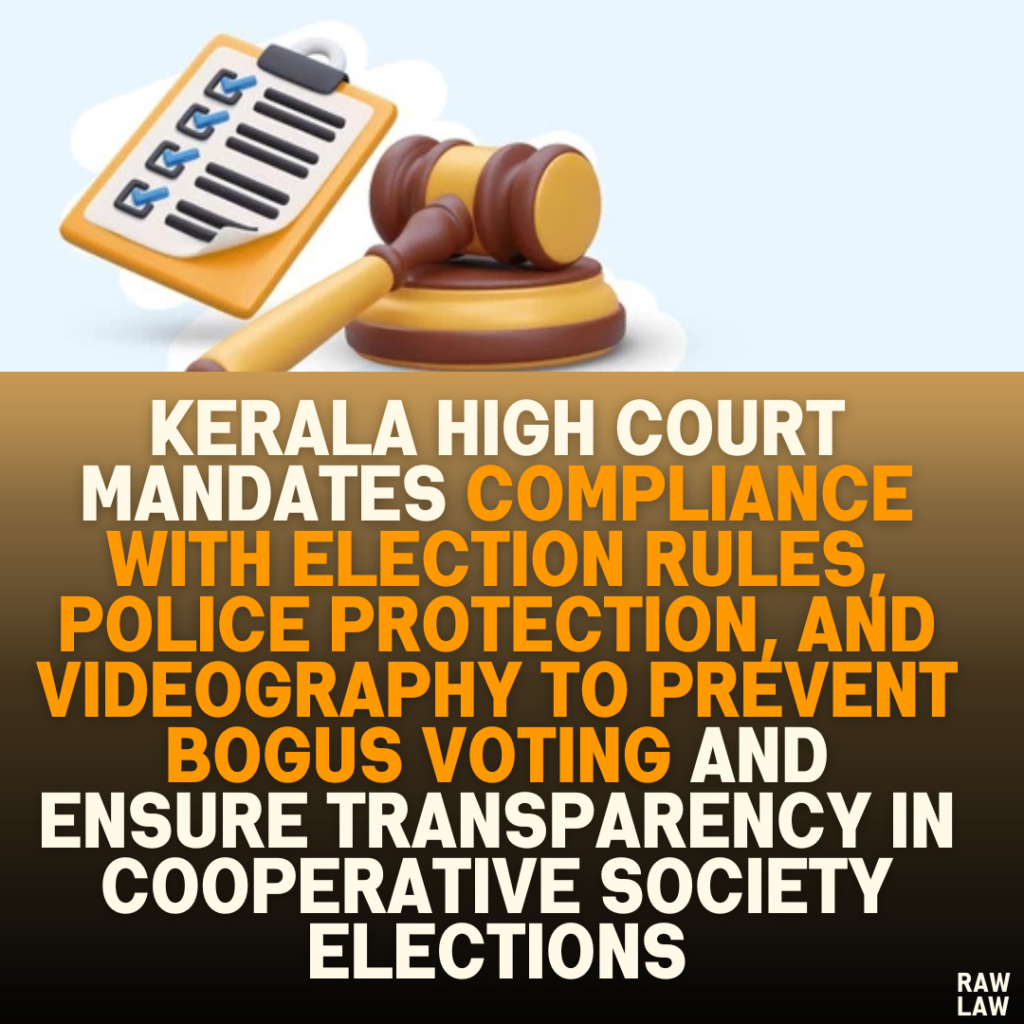Court’s Decision:
The Kerala High Court, in a writ petition concerning the fairness of elections to a cooperative society’s managing committee, issued the following directives:
- Elections must adhere strictly to Rule 35A(6)(n)(ix) of the Kerala Co-operative Societies Rules.
- Police protection must be provided by the concerned authorities to maintain law and order during the elections.
- Videography of the election process was permitted under the Returning Officer’s supervision, ensuring polling secrecy. The petitioner was ordered to bear the expenses of this videography.
The writ petition was disposed of with these specific directions to ensure the smooth and fair conduct of elections.
Facts:
- The petitioner, a member of the Janatha Service Cooperative Bank Ltd., sought directions to ensure the upcoming election, scheduled for November 23, 2024, was conducted fairly.
- Concerns were raised about potential bogus voting and inadequate procedural safeguards.
- The petitioner alleged that prior measures in similar elections were insufficient and sought preventive steps, including:
- Compliance with Rule 35A(6)(n)(ix).
- Police presence to avert disruptions.
- Serial numbering of ballot papers to identify and trace bogus votes.
- Videography of the polling process to enhance transparency and accountability.
Issues:
- Whether the election process met the requirements of Rule 35A(6)(n)(ix) to ensure free and fair elections.
- Whether additional safeguards, such as serial numbering of ballots and videography, were warranted.
- Whether police protection was essential to prevent misconduct during elections.
Petitioner’s Arguments:
- Serial Numbering of Ballots: The petitioner argued that numbering ballots was critical for identifying bogus votes. If a voter claimed their vote had already been cast, serial numbering would facilitate verification and resolution.
- Videography for Transparency: The petitioner emphasized that documenting the election process would prevent malpractice and ensure compliance with legal standards.
- Counting Verification: The petitioner highlighted the need to tally all ballots before formal counting to detect discrepancies or excess ballots.
- Judicial Precedent: The petitioner referenced a prior judgment (WP(C) No. 37540/2024) in which similar directions were issued for transparency in elections.
Respondent’s Arguments:
- Existing Measures: The respondents, represented by Standing Counsel, contended that ballot papers were already serially numbered. Counting processes included safeguards to ensure accuracy.
- Compliance Assurance: The respondents confirmed that elections would follow Rule 35A(6)(n)(ix), ensuring procedural integrity.
- Support for Directions: The respondents did not object to directions similar to the cited judgment and acknowledged the need for police protection and adherence to procedural rules.
Analysis of the Law:
- Rule 35A(6)(n)(ix): This rule governs the conduct of elections in cooperative societies, emphasizing transparency and procedural integrity to prevent malpractice.
- Election Videography: Videography has been increasingly recognized as a measure to deter irregularities, provided it does not compromise voter confidentiality.
- Police Protection: Section 67 of the Kerala Co-operative Societies Act mandates police presence to safeguard elections, highlighting the importance of law enforcement in maintaining order and fairness.
Precedent Analysis:
- The petitioner relied on WP(C) No. 37540/2024, where the High Court had directed similar measures, including videography, to ensure transparent election processes. The Court had underscored the balance between voter privacy and the need for documentation to prevent malpractice.
Court’s Reasoning:
- Fairness and Transparency: The Court emphasized the importance of strict adherence to the procedural safeguards outlined in the Kerala Co-operative Societies Rules to ensure free and fair elections.
- Videography and Secrecy: Videography was permitted under the Returning Officer’s supervision, ensuring that the secrecy of voting was maintained.
- Police Presence: Recognizing the potential for disturbances during elections, the Court directed law enforcement agencies to provide adequate protection to ensure a peaceful process.
The Court balanced the petitioner’s concerns with procedural integrity and voter confidentiality to ensure an equitable resolution.
Conclusion:
The High Court disposed of the writ petition with the following directions:
- Elections must comply strictly with Rule 35A(6)(n)(ix) of the Kerala Co-operative Societies Rules.
- Police protection must be provided by respondents to maintain law and order.
- The petitioner may videograph the election process under the Returning Officer’s supervision, ensuring polling secrecy. The costs of videography will be borne by the petitioner.
Implications:
This judgment underscores the judiciary’s commitment to upholding electoral transparency and fairness in cooperative societies. By integrating modern safeguards like videography with traditional procedural rules, the Court highlighted the importance of balancing transparency and confidentiality. These directions also serve as a precedent for future disputes in cooperative society elections, ensuring adherence to legal standards and deterring electoral malpractice.



